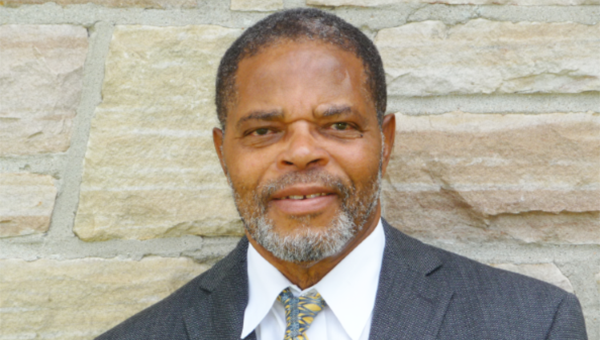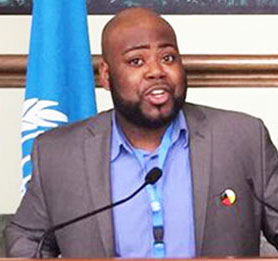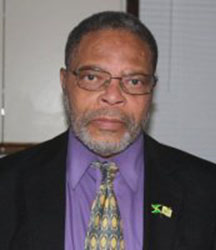Photo above: Kingsley Gilliam, a director of the Black Action Defense Committee (BADC). Photo credit: Jamaican Diaspora Canada Foundation.
By Neil Armstrong
PRIDE Contributing Writer
TORONTO, Ontario — The Ontario Human Rights Commission (OHRC), African Canadian Legal Clinic (ACLC) and Black Action Defense Committee (BADC) agree that the Ontario government’s new regulation prohibiting carding or street checks is a positive step, but they still have concerns.
Renu Mandhane, Chief Commissioner of the Ontario Human Rights Commission, says, the OHRC is generally happy that the government has shown leadership in terms of addressing carding.
Meanwhile, Anthony Morgan, policy and research lawyer at the ACLC, says, the framework that is provided offers a promising, though imperfect, regime for fair and equitable policing.
Kingsley Gilliam, a director of BADC, has described March 22, the day the Ontario government sent out a press release about the new regulation, as a “great day in the lives of all Black and other racialized people of Ontario.”
The Ontario government has announced, that it is building safer communities and protecting individual rights by banning the arbitrary and race-based collection of identifying information by police, referred to as carding or street checks.
The regulation, which becomes effective January 1, 2017, also sets out, for the first time in Ontario’s history, clear and consistent rules for a range of voluntary police-public interactions, where police are seeking to collect identifying information.
These rules will ensure that those interactions are conducted, without bias or discrimination, and done in a manner that promotes public confidence and keeps Ontario communities safe, the government says.
“Some of the good things about the regulation are, for example, it offers a lot of guidance, in terms of the use of race when conducting street checks and when that is or isn’t appropriate. It has some proactive rights notification so officers are required to inform people of the reasons for the street checks and their right not to provide personal information so that’s really positive. Under most circumstances, officers need to provide a receipt which, again, is quite positive,” says Mandhane.
Morgan says, the receipting, while again another promising element that the ACLC supports, there is nothing that requires officers to put the reason for the stop on the receipt.
“They have to put the reasons in their own documentation for when they’re reporting to their force, but for the individual citizen who’s walking away with that receipt, there is no absolute requirement that it says why they were stopped in the first place.
“It’s important that the OIPRD’s [Office of the Independent Police Review Director] information is in there, it’s important that the officer’s name, badge number, and all that, but one of our concerns is that you might end up in a he say/she say, so the person may have no real understanding why they were stopped, it doesn’t say so on the receipt, they feel it’s unjust, they go to challenge it and the officer already has a reason that’s not consistent with that person’s sense of what took place,” said Morgan.
Regarding the receipting, Morgan also says, the ACLC position was that those receipts should also include a notice to individuals on how to make a complaint to the Ontario Human Rights Tribunal.
“That’s not in the receipt. Again, we feel that that was important because, again, if you look at the stats, we’re only having this conversation because we know it disproportionately impacts Black and racialized people. So, to rebalance the scales, I think it would have been a fair gesture towards fair and equitable policing to include that, but that’s not there,” he added.
The OHRC is also concerned the receipt does not include the reason for the stop, an aspect which Mandhane says, is quite important for any kind of long-term accountability to see why people were stopped.
“Where they can complain, I think, is an issue, but I think the bigger issue is that it doesn’t include the reason for the stop,” she noted.
She adds, the OHRC believes the regulation needs to be accompanied by a “Know Your Rights” sort of campaign because, given the dynamics, the power differential between the people, who tend to be stopped, and the police, “people really have to know when they’re allowed to walk away.”
“I think that is something that the community really wants to see; support for some sort of understanding, from a community perspective, about what the regulation permits and doesn’t permit. We know that the regulation contemplates training for police officers on what they should and shouldn’t do, but we also think that the community will need training or awareness on what the regulation permits and doesn’t permit,” the OHRC Chief Commissioner said.
The regulation also establishes new training, data management, reporting, and other requirements to strengthen accountability.
The final regulation – which is mandatory for all police services across the province – reflects feedback from public consultations on how the regulation can further enhance accountability, transparency, oversight, and public confidence.
These include: appointing an independent reviewer, who will complete a review of the regulation within two years of full regulatory implementation, in consultation with the Anti-Racism Directorate, and clarifying language and scope of the regulation to ensure a consistent application across Ontario.
Also included is establishing a training advisory roundtable comprised of policing, civil liberties, human rights, and youth experts to provide feedback to the Ontario Police College in developing a new training curriculum for all police officers in Ontario.
The Ministry of Community Safety and Correctional Services will also launch a multi-year, academic study to better understand the impact on community safety from collecting identifying information through police interactions with the public.
“This regulation delivers on our government’s commitment to prohibit carding and street checks in Ontario. It both bans the arbitrary and race-based collection of identifying information and establishes clear and consistent rules for police officers to protect individual rights in interactions that help keep our communities safe.
“Our regulation reflects the public input we received from Ontarians, and our work with civil liberties, human rights, policing, legal and community partners, as well as ethnic and cultural groups. These important changes will help strengthen public accountability and foster increased public trust in police, which is essential for building a stronger, safer Ontario,” says Yasir Naqvi, Minister of Community Safety and Correctional Services.
The OHRC Chief Commissioner welcomes the fact that the regulation will be subject to an independent review in two years.
“I think Minister Naqvi has shown a lot of leadership in terms of putting out the regulation, especially given the police opposition to the regulation. We do still have some concerns about the regulation. I think the biggest issue is that it won’t actually ban all street checks, and what we know is, that many street checks are conducted during the course of an investigation. During the course of that investigation they can still racially profile, usually young Black men, and collect their information, and that isn’t banned under the new regulation,” says Mandhane.
Gilliam says, the announcement of the regulations provides hope of a better future and better relations with police forces all over Ontario, while Morgan notes, that the regulation is promising, as it relates to rights notification, giving individuals receipts and the oversight mechanisms that are embedded.
“These are things that we should recognize as advances that were hard fought by community and now is reflected in the regulations, however, there is still limitations, and important limitations, that will have a serious impact on community,” says Morgan.
He explains, for instance, there is no specification for when officers have to give the rights notification to an individual.
“Our position has always been that, that should come at the outset. It should be explicitly noted at the beginning of the interaction; officers should know, and should be directed, to let people know that they do not have to give their information. That’s an important limitation,” the ACLC lawyer said.
Meanwhile, Gilliam says, the new regulation outlaws carding or street checks, and requires police services to file annual reports on the number of interactions that the police, from each service, had with civilians during the period.
“The black and brown population of Ontario have been subjected to this dehumanizing, racially motivated abuse of police powers since the creation of the Metropolitan Police Force in the 1950s,” says Gilliam.
However, Morgan says, while promising, another imperfect element of the regulation is that there is no accounting for young people and their lower, moral culpability generally.
He adds, “It treats everybody as if they’re all the same, but we know that young people are not only the most impacted by this practice but they also have less of a sense of what their rights are. They are more vulnerable, as a people, and that’s not properly accounted for with the new regulations. And, because the data shows, overwhelmingly, this targets young people, it’s an oversight that should simply not have happened as it relates to the regulations.”
As of January 1, 2017, officers must inform the person of their right to not provide identifying information and officers must provide a reason for requesting identifying information.
The reason cannot be arbitrary, that the person declined to answer a question or attempted to end the interaction, or based on race or solely because that individual is in a high-crime location.
Officers must offer a document that includes the officer’s name and badge number and information on how to contact the Office of the Independent Police Review Director if there are concerns about the interaction.
Officers must keep detailed records about each interaction, and failure to comply with the regulation, will be a Code of Conduct violation for police officers.
To ensure police can continue to do their work safely, the regulations allow exemptions in some specific situations, for example: if the person is legally required to provide information (e.g. during a traffic stop), and if the person is under arrest or being detained, or when the officer is executing a warrant.
Other situations include, if complying with a specific aspect of the regulation would compromise an ongoing investigation or compromise safety; and if the officer has a reasonable suspicion that the interaction is necessary to their investigation of an offence that has been committed or that the officer reasonably suspects will be committed.
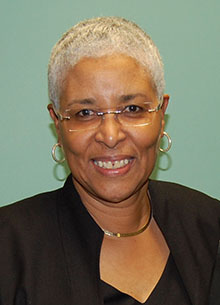
Former banking executive, politician and community builder, Mary Anne Chambers, has been appointed to the Ontario government expert round table, that will provide input to the Ontario Police College on the development of new training for police officers. Photo credit: the African Canadian Achievement Awards (ACAA).
Starting immediately, the minister will appoint a roundtable with knowledge of human rights, community needs, issues affecting youth, privacy laws, curriculum development, policing and other relevant fields to provide input to the Ontario Police College on the development of new training for police officers.
The members include: Barbara Hall, former Ontario Human Rights Commissioner; Mary Ann Chambers, former MPP and Minister and community advocate; Joanne St. Lewis, professor at the University of Ottawa; Armand La Barge, former Chief of Police, York Regional Police Service; Ann Cavoukian; former Information and Privacy Commissioner; and Orlando Bowen, Executive Director, One Voice One Team.
Additional members, representing, for example, Indigenous interests, will be added in the coming weeks.
The training will include topics such as discrimination, racism, bias awareness, police-public interactions and avoiding psychological detention, in addition to what police need to do to ensure they comply with the new regulations.
All officers in Ontario will have completed training by January 1, 2017.
An independent reviewer will be appointed in the coming months, reporting to the minister to: conduct a review of the regulation, to be completed within two years of full implementation, and to make recommendations to improve the implementation of the regulation.
The independent reviewer will consult with the Anti-Racism Directorate in the review and in the development of recommendations.
Morgan says, the oversight is a very important thing, in terms of the monitoring, not only internally after a year, like with the annual reporting, but also they have an independent reviewer power that has been added.
“That’s something we very much support and we would like to see more community take advantage of that, to be involved in this process to hold our police force accountable.”
Once in place, the new regulations will require all collections of identifying information submitted to be reviewed within 30 days by the Chief of police or designate.
Police services will no longer be permitted to use targets/quotas for the collection of identifying information.
Chiefs of police must ensure that officers and supervisors complete relevant training every three years.
The Chiefs of police must also complete an annual public report that includes information such as the number of attempted collections; gender, age, and race of the individuals stopped; number of times officers relied on exemptions; and the neighbourhoods where information was collected.
If the annual report indicates that a particular group (i.e. members of a racialized group) is found to be disproportionately affected, the chief must submit a supplemental report to the police services board with an explanation and, in some cases, a proposal to address the disproportionate impact.
Police services boards and the Ministry of Community Safety and Correctional Services (for the OPP) will develop policies related to the regulations, for example regarding access, retention and disclosure of collected information.
Polices service boards must make any supplemental reports from the chief of police available online.
“We feel, strongly, that it’s very important to have this framework as a basis. It’s a minimum standard for policing and, I’m comfortable saying, that it is a very strong minimum standard from which we can build and push our different police forces across Ontario to make better do on in other ways.
“One element of concern that I think everyone in community should know, is that the regulation has left it open to the various police forces, in the different jurisdictions, to decide what they’re going to do with the legacy data. So, it doesn’t eliminate all that data, its going to be piece by piece, jurisdiction by jurisdiction. This is why its extremely important for community to be actively involved, go to their police services board meetings, tell them that we want those data to be expunged if its not consistent with the policy as is now, if they find that the past information was taken and it was taken in a context that would not have survived this current regime, it should be gone,” says Morgan.
Meanwhile, Black Lives Matter Toronto, says, the regulation falls short and is calling for a commitment to the full elimination of carding, including the deletion of all previously recorded data, reframing of regulations to prohibitions, consistent implementation policy amongst different police boards, and concrete disciplinary measures for officers who continue to card.
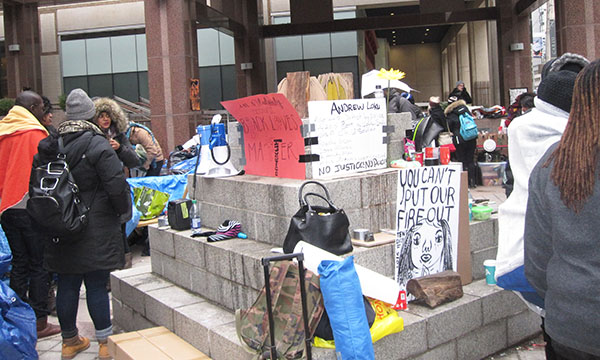
Black Lives Matter-Toronto protesters demonstrate outside Toronto Police Services Headquarters. Photo by Neil Armstrong.
The OHRC shares that concern about the data, a piece in the new rules that Mandhane described as quite weak.
“The data that is currently in the database isn’t being purged and we know that includes data from thousands of innocent people. But, even in terms of the database, required to be kept under the regulation, there is nothing in the regulation that requires them to purge that data at any point in time. We have been calling for a purge of data that might have been included inappropriately, within five years, and that isn’t happening.”
The OHRC Chief Commissioner says, the regulation has been the focus of so much advocacy on the part of the commission and community groups and the Black community, but it will not eliminate racial profiling.
“It really is about a very particular practice of gathering information and entering it into a database, and we know that racial profiling happens in many, many other circumstances, beyond carding or street checks. And I think that’s what the Black Lives Matter group is protesting, like excessive use of force, lack of accountability, and we’ve also raised concerns, for example, in relation to DNA sweeps, over-policing of the Black community. So, we think this is a very good step, we think that we really need to see police services, and from the chiefs and the boards, in particular, to really commit to ending racial profiling across the board,” she noted.
Mandhane adds, the OHRC, along with community groups, is hoping to reach out to the roundtable training committee, so that they understand “some of our perspective on what we believe that training should include.”
“I would really focus on the Minister’s talk about training on bias and discrimination and racism. And, we really want that to be interpreted to include racial profiling, because much of the disproportionate policing of racialized people isn’t because of overt racism, but rather, because of racial profiling and we want police to be trained on that really subtle distinction,” she further explaned.
The OHRC is also concerned, like Morgan, that the government has not required standardization of the type of data that is collected.
“What that means is, it’s going to be hard to compare, for example, Toronto to Ottawa to Hamilton, because they are potentially going to be collecting different data; so from an accountability perspective, it makes it harder to kind of have a provincial picture of what different services are doing,” she says.
In an opinion piece in the Toronto Star this week, Mandhane says, this is why the OHRC is very focused on really advocating police services and police boards to “live up to the spirit and intent of the regulation and not to kind of read it in an overly technical manner to try and figure out where the loopholes are.”
She says, Minister Naqvi is undertaking a review, the Strategy for a Safer Ontario, and that involves potentially opening up the Police Services Act and so the OHRC will be making submissions to the Minister.
Much of its submission will focus on racial profiling, says Mandhane, and although the OHRC sees the new “carding” regulation as a good first step, it will continue its advocacy in terms of racial profiling and policing.
 Pride News Canada's Leader In African Canadian & Caribbean News, Views & Lifestyle
Pride News Canada's Leader In African Canadian & Caribbean News, Views & Lifestyle

